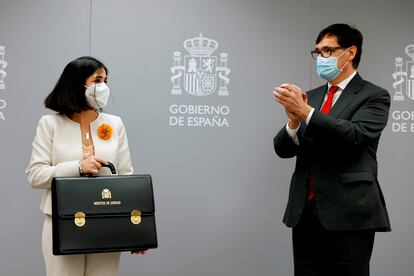Spanish Health Ministry wants ‘corrective’ measures against vaccination irregularities
New minister Carolina Darias will head a meeting to discuss coronavirus-related issues while Portugal announces it is closing its border with Spain

The Spanish Health Ministry will ask regional governments to closely monitor the Covid-19 vaccine administration process, to avoid new cases of people getting immunized ahead of time thanks to their influence or contacts.
Spain is struggling to contain a surge in coronavirus cases that is stretching hospitals to the breaking point in several parts of the country. On Thursday afternoon, Portugal said it will close its border with Spain on Friday for at least two weeks in a bid to curb its own soaring caseload.
A draft ministry document first reported by the daily El Mundo and which EL PAÍS has seen asks regional authorities for “preventive and corrective measures” to guarantee that shots are administered according to the government’s list of priority groups. What these measures should be is not specified.
If the government of Spain thinks that things are that bad, then let it actMadrid regional premier Isabel Díaz Ayuso
The first stage of the vaccination campaign seeks to immunize care home residents and employees, healthcare workers and people with need for daily assistance who are not living in care facilities. But in recent days there have been reports about hundreds of ineligible individuals who managed to get vaccinated ahead of time – including politicians, a bishop and an army general.
“This is not just about responsibility, it’s also about solidarity with the most vulnerable segment of the population and with those who are most exposed to the virus,” reads the document, to be presented at a meeting of central and regional health officials on Thursday afternoon.
The gathering will be presided by Spain’s new health minister, Carolina Darias, who this week replaced Salvador Illa. The latter stepped down in order to run as a candidate in upcoming regional elections in Catalonia.
Vaccine delays
The meeting will also address recent delays in vaccine shipments that are complicating the immunization campaign. A new survey by the Center for Sociological Studies (CIS) shows a sharp rise in Spaniards’ willingness to get the vaccine: 72.5% are now ready to do so, compared with 40.5% in December. In another recent survey by the Science Ministry, 58.1% of respondents said they were “completely certain” that they would get vaccinated tomorrow if they had the chance.
Health officials are also expected to discuss the EU’s recommendation to isolate areas with a 14-day coronavirus incidence of 500 per 100,000 inhabitants. Most of the Spanish territory is posting numbers above that threshold, with the Valencia region currently heading the list at more than 1,400 cases per 100,000.
In Madrid, where the 14-day incidence is 989 per 100,000, regional premier Isabel Díaz Ayuso of the Popular Party (PP) insisted that she is not prepared to adopt more restrictions against the virus despite the negative data. “If the government of Spain thinks that things are that bad, then let it act,” she said, in a challenge to the central executive led by Pedro Sánchez, of the Socialist Party (PSOE). Under the current state of alarm approved by parliament in October, it is up to regional governments to handle the situation through their own policies. Last year’s three-month home lockdown, by contrast, was decreed by the central government.
With reporting by Pablo Linde, Isabel Valdés and Juan José Mateo.
English version by Susana Urra.
Tu suscripción se está usando en otro dispositivo
¿Quieres añadir otro usuario a tu suscripción?
Si continúas leyendo en este dispositivo, no se podrá leer en el otro.
FlechaTu suscripción se está usando en otro dispositivo y solo puedes acceder a EL PAÍS desde un dispositivo a la vez.
Si quieres compartir tu cuenta, cambia tu suscripción a la modalidad Premium, así podrás añadir otro usuario. Cada uno accederá con su propia cuenta de email, lo que os permitirá personalizar vuestra experiencia en EL PAÍS.
¿Tienes una suscripción de empresa? Accede aquí para contratar más cuentas.
En el caso de no saber quién está usando tu cuenta, te recomendamos cambiar tu contraseña aquí.
Si decides continuar compartiendo tu cuenta, este mensaje se mostrará en tu dispositivo y en el de la otra persona que está usando tu cuenta de forma indefinida, afectando a tu experiencia de lectura. Puedes consultar aquí los términos y condiciones de la suscripción digital.









































